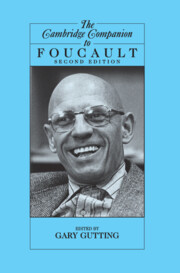Book contents
- Frontmatter
- Introduction Michel Foucault: A User’s Manual
- 1 Foucault’s Mapping of History
- 2 Foucault and the History of Madness
- 3 The Death of Man, or Exhaustion of the Cogito?
- 4 Power/Knowledge
- 5 Ethics as Ascetics: Foucault, the History of Ethics, and Ancient Thought
- 6 Michel Foucault’s Ethical Imagination
- 7 The Analytic of Finitude and the History of Subjectivity
- 8 Foucault’s Encounter with Heidegger and Nietzsche
- 9 Foucault and Habermas
- 10 Foucault’s Relation to Phenomenology
- 11 Against Interiority: Foucault’s Struggle with Psychoanalysis
- 12 Foucault’s Modernism
- 13 Queering Foucault and the Subject of Feminism
- Bibliography
- Addendum to Bibliography, 1993–2005
- Index
8 - Foucault’s Encounter with Heidegger and Nietzsche
Published online by Cambridge University Press: 28 August 2006
- Frontmatter
- Introduction Michel Foucault: A User’s Manual
- 1 Foucault’s Mapping of History
- 2 Foucault and the History of Madness
- 3 The Death of Man, or Exhaustion of the Cogito?
- 4 Power/Knowledge
- 5 Ethics as Ascetics: Foucault, the History of Ethics, and Ancient Thought
- 6 Michel Foucault’s Ethical Imagination
- 7 The Analytic of Finitude and the History of Subjectivity
- 8 Foucault’s Encounter with Heidegger and Nietzsche
- 9 Foucault and Habermas
- 10 Foucault’s Relation to Phenomenology
- 11 Against Interiority: Foucault’s Struggle with Psychoanalysis
- 12 Foucault’s Modernism
- 13 Queering Foucault and the Subject of Feminism
- Bibliography
- Addendum to Bibliography, 1993–2005
- Index
Summary
How fruitful is it to relate Foucault to Heidegger and Nietzsche? What can be learned about the genesis of Foucault's thought from such a comparison? How does it illuminate the nature and content of his thought? How does it expand our understanding of the phenomena that Foucault explores? Hubert Dreyfus and Paul Rabinow have shown us how much one can gain from reading Foucault and Heidegger together. Their book inspired Foucault to say to an interviewer, “Two of my friends in Berkeley wrote something about me and said that Heidegger was influential. Of course it was quite true, but no one in France has ever perceived it.” That does not mean, however, that Foucault should be read as a genuinely Heideggerian thinker, for one must also remember that he told the same interviewer that “Nietzsche was a revelation to me. . . I read him with great passion and broke with my life, left my job in the asylum, left France.” He never attributed an equally crucial role to Heidegger. In contrast to the thesis put forward by Dreyfus and Rabinow, I consider it, in fact, more fruitful to read Foucault in Nietzschean terms. One must remember what he said in his last interview in 1984:
I am simply a Nietzschean, and try as far as possible, on a certain number of issues, to see with the help of Nietzsche’s texts – but also with anti-Nietzschean theses (which are nevertheless Nietzschean!) – what can be done in this or that domain. I attempt nothing else, but that I try to do well.
(FL, 327)- Type
- Chapter
- Information
- The Cambridge Companion to Foucault , pp. 210 - 239Publisher: Cambridge University PressPrint publication year: 2005
- 12
- Cited by



